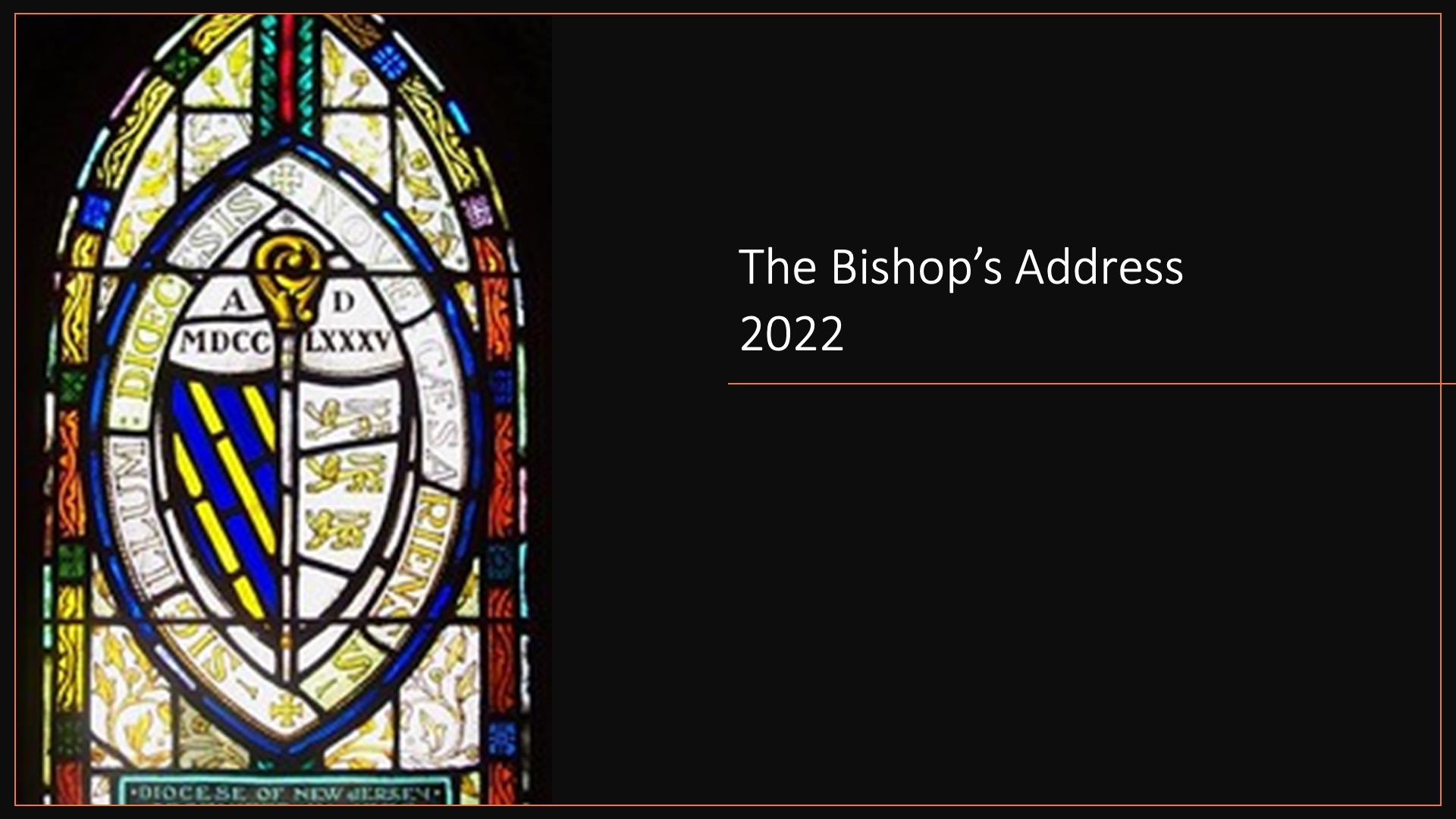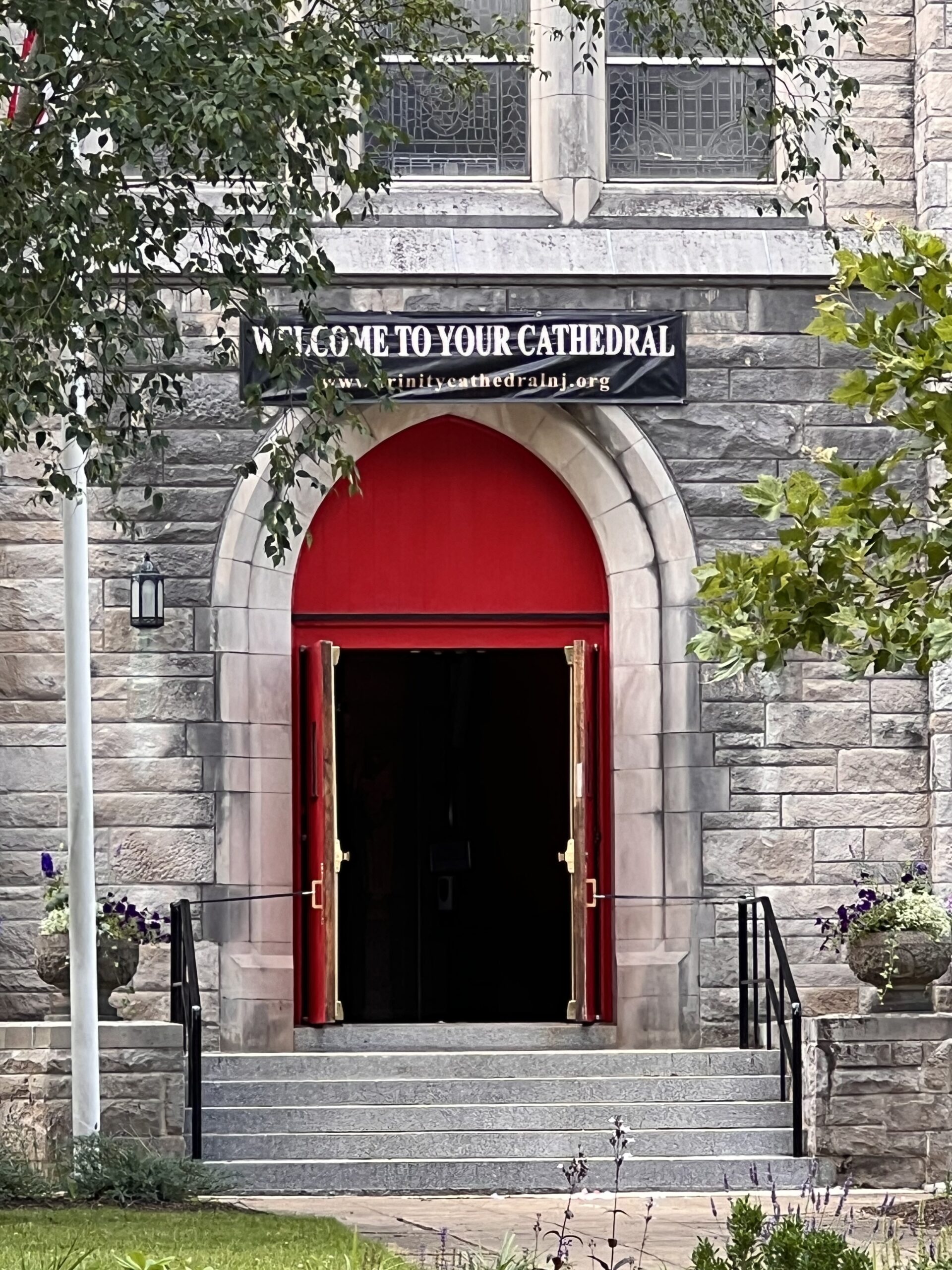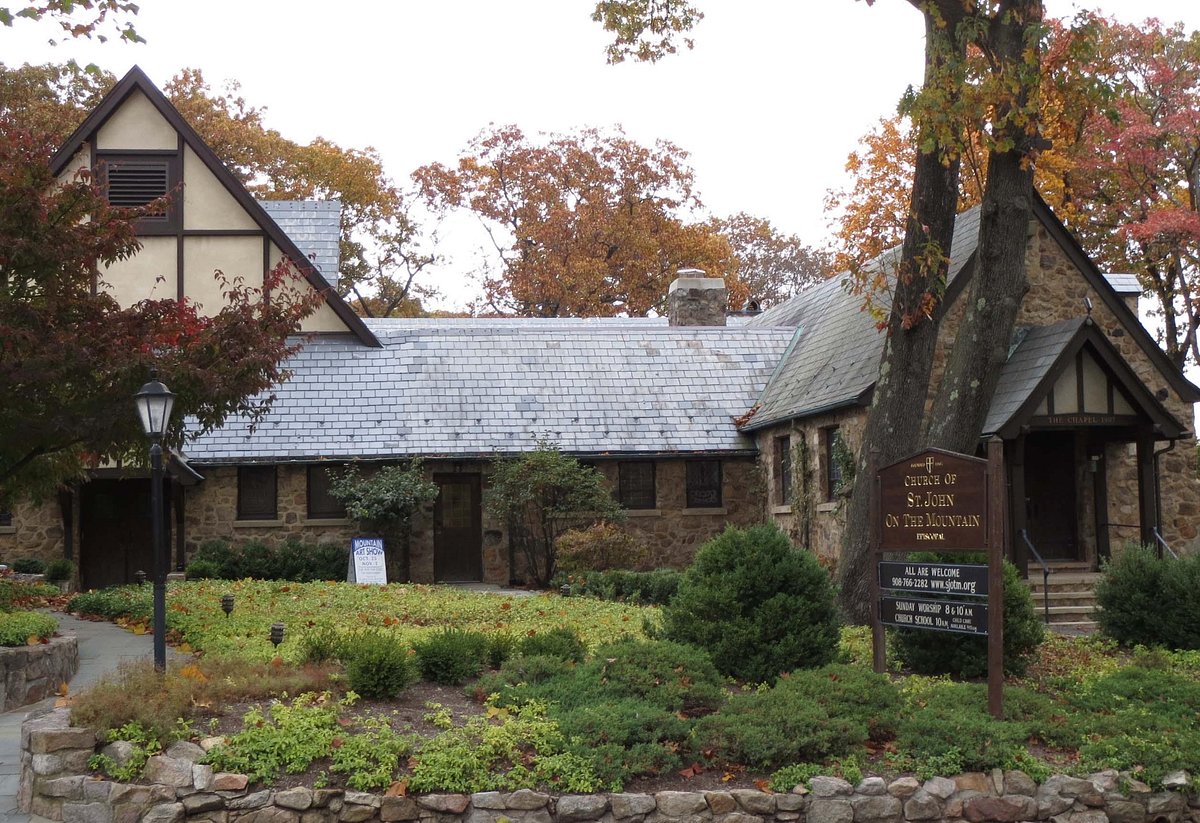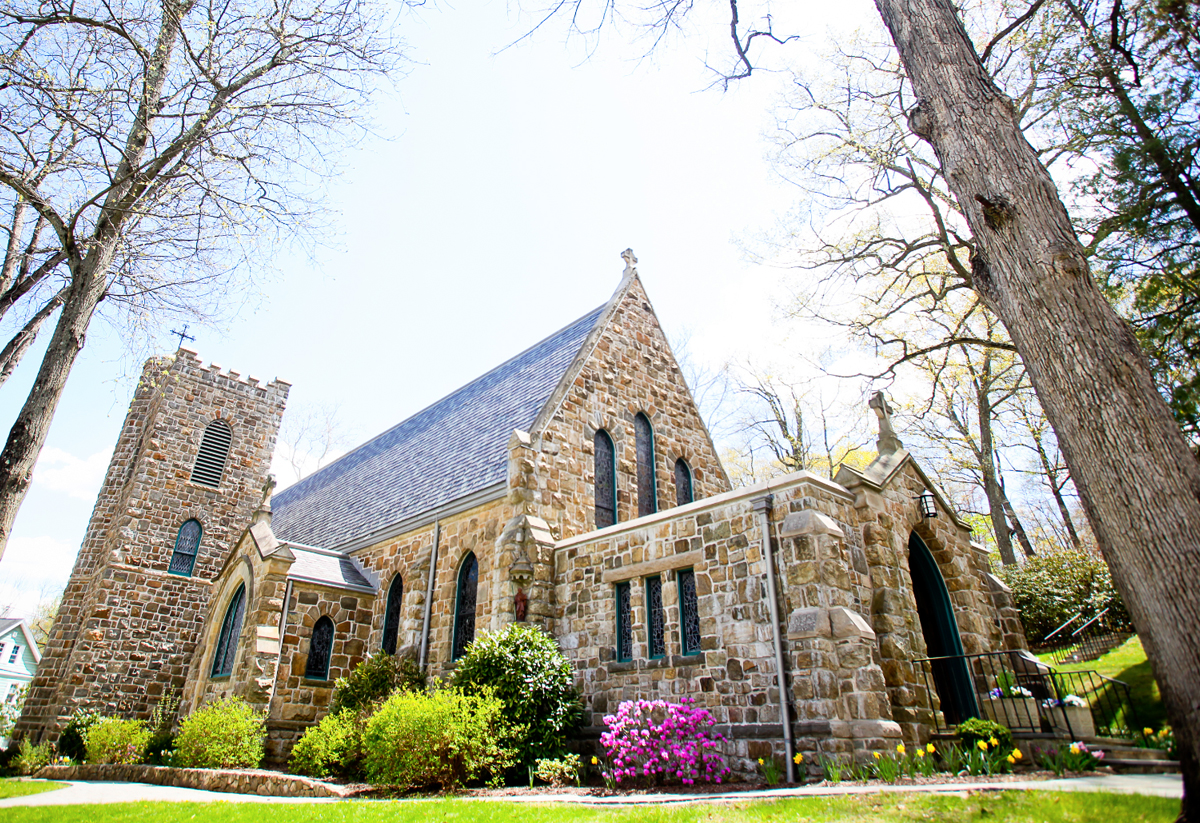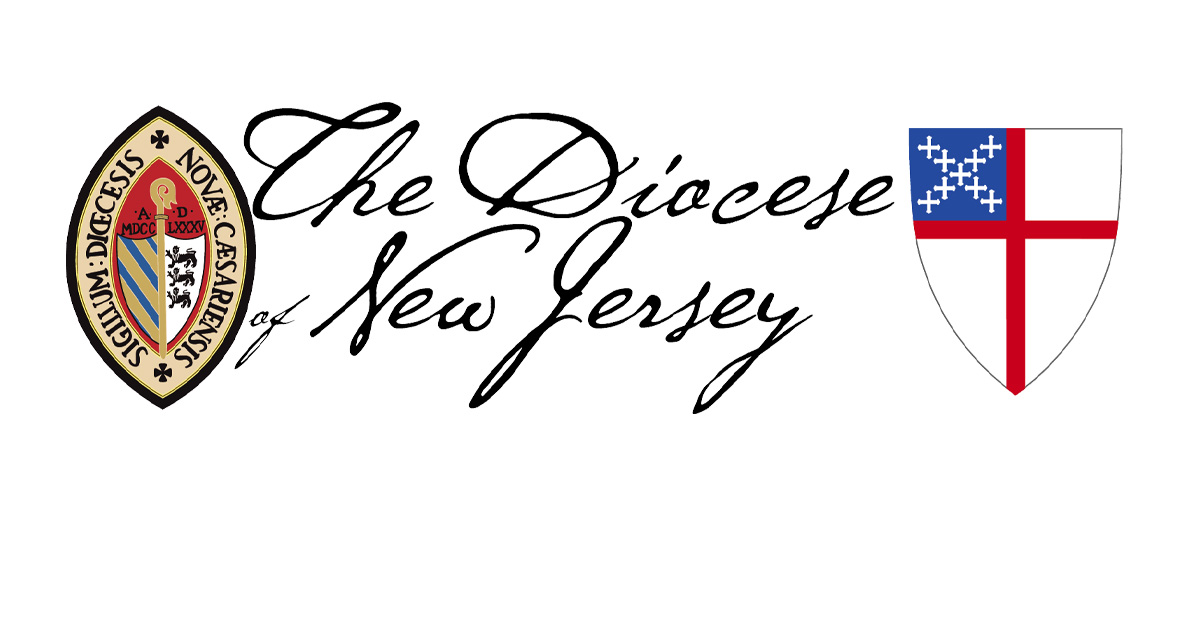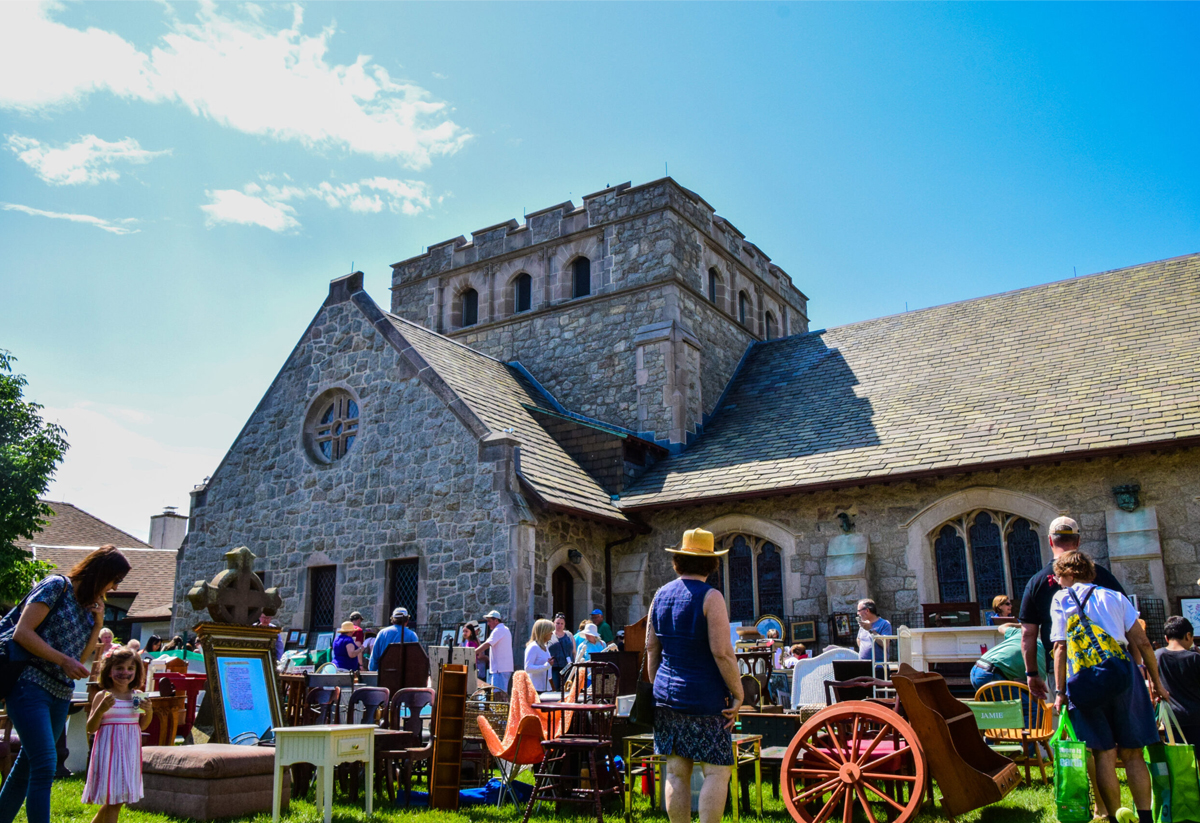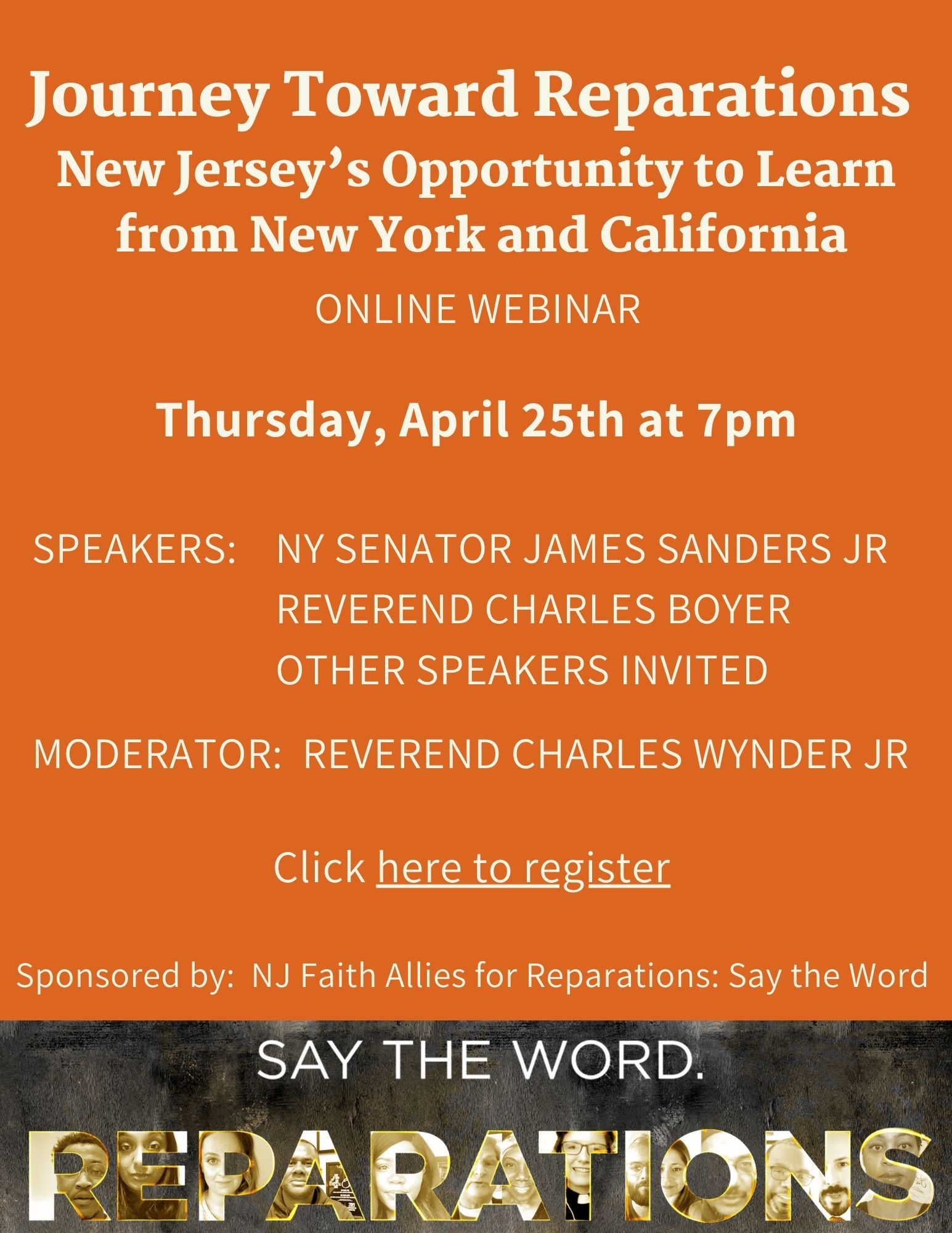Video of Bishop Chip Stokes addressing the 238th Diocesan Convention on March 5.
Bishop’s Address to Diocesan Convention – March 5, 2022
The Right Reverend William H. Stokes, 12th Bishop of New Jersey
From St. Paul’s First Letter to the Church at Corinth:
According to the grace of God given to me, like a skilled master builder I laid a foundation, and someone else is building on it. Each builder must choose with care how to build on it. For no one can lay any foundation other than the one that has been laid; that foundation is Jesus Christ (1 Corinthians 3:10-11).
Throughout my ordained ministry this passage has been important to me, first as a priest, especially as the rector of St. Paul’s Church in Delray Beach, Florida; and then as the 12th Bishop of the Diocese of New Jersey. As the Presiding Bishop will note in his recorded greeting to us, which you will hear later this morning, we’re already in transition. In truth, we’re always in transition. And let’s face it, we are all interims, lay and clergy, always. We are interims who have received an inheritance—this diocese, the congregations of which we are a part, even this Episcopal Church. We’ve all built on the inheritance we have received, the foundation of which was laid 2000 years ago. That foundation was Jesus Christ. That foundation remains Jesus Christ; his mission; his ministry; his Gospel; his Kingdom. As one of my favorite hymns says so well, Christ is made the sure foundation; Christ, the head the cornerstone![1] Yesterday, today, tomorrow and always.[2]
How honored and privileged I’ve been to work with you, to build with you these past eight years plus. I give all praise, thanks, and glory to God. I know it’s imperfect, this building we’ve been up to; that we continue to work on. Time will tell of what material our construction work has been made—gold, silver, precious stones, wood, hay, straw (1 Corinthians 3:12).
By God’s grace, and if all goes according to plan, we will know who the 13th Bishop of New Jersey will be by the next diocesan convention, which is scheduled to be held on March 4, just under a year from now. The day of the Episcopal election has been set. It will be held in Trenton on January 28th at Trinity Cathedral. That day will come quickly. Then that person will pick up the work and continue to build.
Supervision of the Episcopal Election process is in the overall hands of the Standing Committee. I am thankful for the leadership of Standing Committee President Fr. Ed Zelley and the other members: Sue Espenshade, Donna Friedel, Canon Andy Moore, Rev. Lisa Hoffman, Ashley Maddison, Paul Wolfgang and Rev. William Ndishabandi, for work they have already done, especially in interviewing and retaining the services of Episcopal Election consultant The Rev. Ron Clingenpeel who is familiar with the Diocese of New Jersey from his experience serving as the consultant during the election of the 12th Bishop. Fr. Ndishabandi and Ashley Maddison rotate off the Standing Committee with this Convention. I am deeply grateful to them for their sage counsel and advice over their years of service.
The Episcopal election process invites us all, under the guidance of the Holy Spirit, to a time of reflection and prayerful discernment, about what God is up to in and through this diocese, and the kind of Bishop that is needed for God’s future, and God’s mission and ministry. The Bishop Search and Nomination Committee is called to lead the diocesan community through this prayerful discernment process.
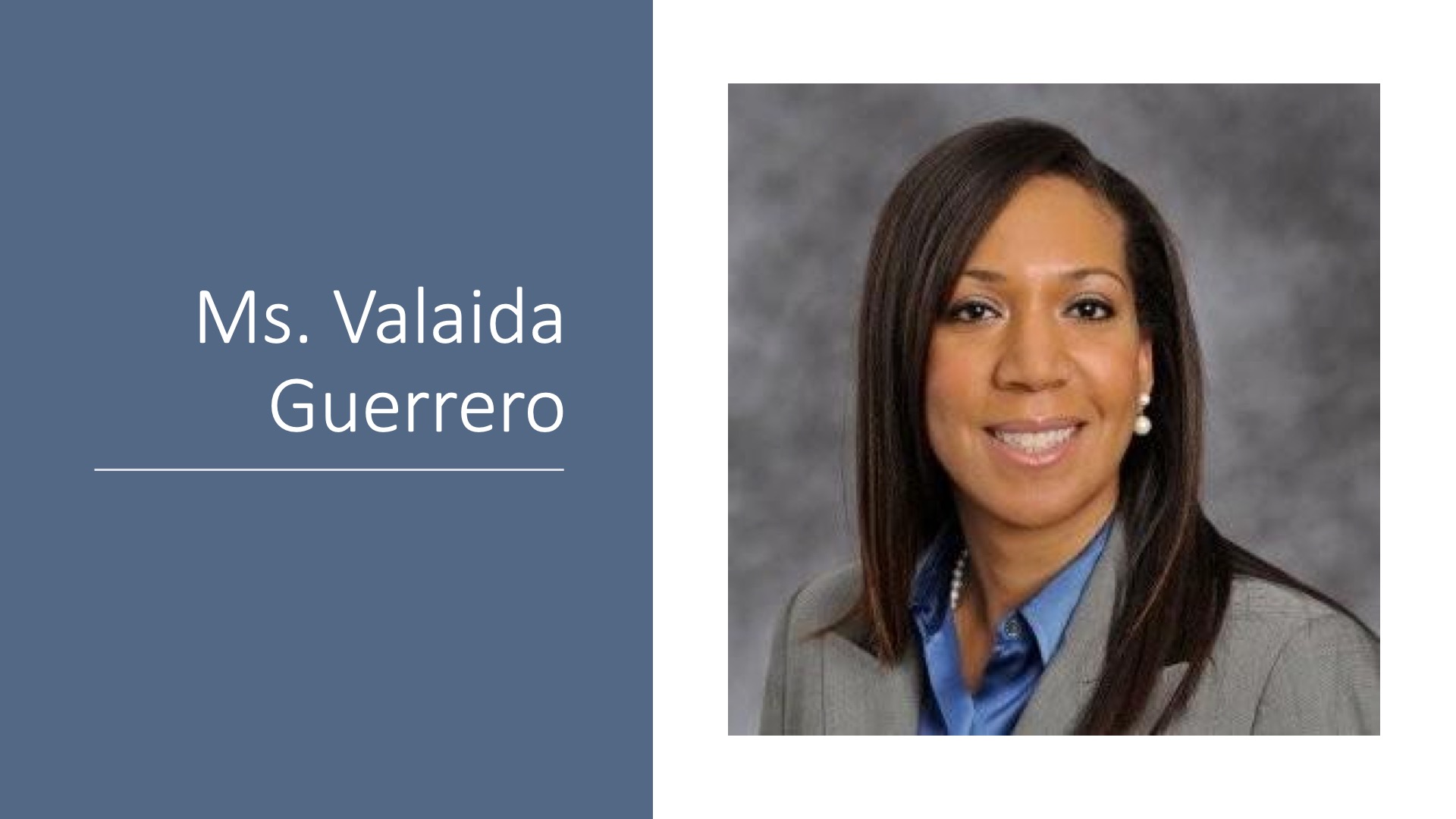 I am grateful to Ms. Valaida Guerrero who graciously accepted my nomination of her as Chair of the Bishop Search and Nomination Committee. I can assure you we are all blessed to have this enormously gifted twoman in this role. The Bishop Search and Nomination Committee has been formed and is well into its work. In fact, the Committee has given you, and everyone in this diocese homework to do: To complete the on-line assessment. And there is a deadline: March 8th. The Episcopal election is a community process and decision. A democratic, Episcopal election process is one of the great beauties and gifts of The Episcopal Church to the wider church. Valaida will say more about the process and your part in it when she reports to the Convention this afternoon.
I am grateful to Ms. Valaida Guerrero who graciously accepted my nomination of her as Chair of the Bishop Search and Nomination Committee. I can assure you we are all blessed to have this enormously gifted twoman in this role. The Bishop Search and Nomination Committee has been formed and is well into its work. In fact, the Committee has given you, and everyone in this diocese homework to do: To complete the on-line assessment. And there is a deadline: March 8th. The Episcopal election is a community process and decision. A democratic, Episcopal election process is one of the great beauties and gifts of The Episcopal Church to the wider church. Valaida will say more about the process and your part in it when she reports to the Convention this afternoon.
During this transition, my tasks as the 12th Bishop are, first, to continue to build on the work we have done together these past eight years and, second, to assure that this transition is orderly, that the 13th Bishop of New Jersey comes into as stable a working system as possible when the crozier is passed.
There was concern expressed during a pre-convention hearing and from at least one clericus about diocesan staffing, and especially around the position of Canon to the Ordinary. I appreciated that these concerns were expressed. I considered them carefully. To alleviate them, I have decided to call The Reverend Joanne Izzo to the role of Acting Canon to the Ordinary and Transitions Officer. Not only a priest, but a trained Social Worker, conflict consultant and coach, Joanne has worked with me, as well as the bishops of New York and Long Island in congregational situations requiring particular care and expertise. I am grateful that she is willing to accept this call.
The agreement we have committed to is through the balance of my episcopate and into the first six months of the episcopate of the 13th Bishop so that the new bishop will have someone reliable in place while he or she comes on board. The new bishop will then have the freedom to determine if they want to continue with Joanne or call someone of their own choosing. It is a gift to me, and to us all, that Joanne is willing to work with that understanding.
I am especially grateful to Rhonda Jackson who has stepped into the breach as our Acting Transitions Officer when Canon Jemmott required a medical leave of absence. Rhonda showed tremendous conscientiousness and commitment in getting up to speed quickly, and in helping us keep on track, and even improve, our transitions processes.
I know I speak not only for myself, but also for diocesan staff and for the congregations, the Interims and the Transition Consultants who have worked with her, in expressing deep thanks for the excellence of her work and commitment to this diocese. It is our expectation that Canon Izzo will come on board on May 1st, and that she and Rhonda will work together through the month of May after which Canon Izzo will take full responsibility for the Transitions Process as well as the other duties expected of a Canon to the Ordinary.
The Acting Canon to the Ordinary and Transition Officer position is funded in the budget that Diocesan Treasurer Jonathan Gloster will present later on. Accomplishing this change did not require either additional funds from our trusts nor the elimination of any items or positions in the budget presented during the Pre-Convention hearings. I am grateful to Canon Phyllis Jones for her excellent work on this. The budget that will be presented also includes the hiring of a Chief Financial Officer, one of two hats currently worn by Phyllis who serves in the dual capacities of COO and CFO. We need to split this position.
We are all blessed that Phyllis has an incredibly wide range of skill sets and an unquestionably strong work ethic and commitment to this diocese and God’s mission. But Phyllis has way too much on her plate. A diocese this size with this much administrative and missional complexity needs the additional support.
Some of you are aware of the volume of work that Phyllis takes on. Others are not. This diocese oversees about $60 million in investments. Our properties across the diocese are worth much more than this. Increasingly, property matters have become a major part of her job, especially when a congregation closes and moves out of their building. Phyllis advocated for the canonical changes that enabled the creation of the Mission Renewal Fund, through which she now helps manage well over $2 million in mortgage receivable assets. The payments received from those assets fund significant missional work in our diocese each year. She also works with local tax authorities when a church closes, or alters a property, jeopardizing its tax status. With Canon Jemmott needing to take medical leave, Phyllis assumed oversight of the Letter of Agreement process, assuring that our clergy compensation guidelines are followed in each instance.
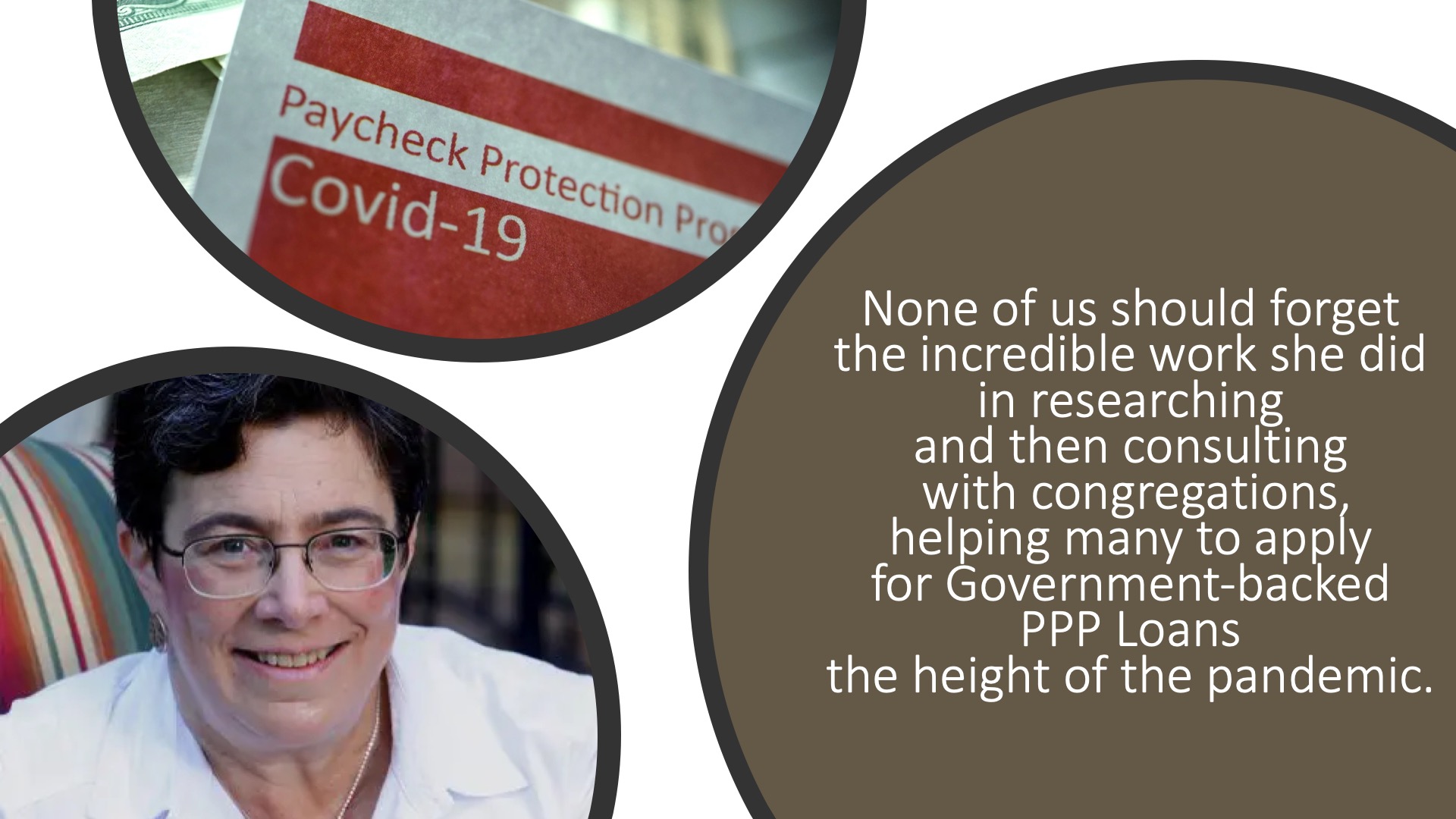 Coordinating with Pat Hawkins, Phyllis deals with our human resource issues including insurance and pension issues. She has been key in networking and coordinating the launch of Episcopal Community Services of the Diocese of New Jersey and has made herself widely available to congregations across the diocese for financial, stewardship and administrative consultations. None of us should forget the incredible work she did in researching, and then consulting with congregations, helping many to apply for Government-backed PPP Loans during the height of the pandemic. Just under $3 million flowed into the diocese as a result of this work. Many of our congregations survived the pandemic because of this. She was amazing!
Coordinating with Pat Hawkins, Phyllis deals with our human resource issues including insurance and pension issues. She has been key in networking and coordinating the launch of Episcopal Community Services of the Diocese of New Jersey and has made herself widely available to congregations across the diocese for financial, stewardship and administrative consultations. None of us should forget the incredible work she did in researching, and then consulting with congregations, helping many to apply for Government-backed PPP Loans during the height of the pandemic. Just under $3 million flowed into the diocese as a result of this work. Many of our congregations survived the pandemic because of this. She was amazing!
Several years ago, I named Phyllis Chief Operating Officer in addition to Chief Financial Officer because it was more descriptive of the work she was actually doing. It still is. A Chief Operating Officer oversees the day-to-day administrative and operational functions of an enterprise and integrates them into its vision and mission. We require a designated Chief Financial Officer to focus on the financial management and functions of the Diocese, including supervision of our accounting personnel and working with our various committees and commissions, including Budget and Finance, on the financial aspects of their work.
I ask you to support both the re-creation of the dedicated Chief Financial Officer position, and the funding of the Acting Canon to the Ordinary and Transitions Officer position by passing the budget as presented. I recognize the pressure these put on the budget, and especially on the use of our trust finds, but given where we are as a church and a diocese right now, I believe these are prudent and right decisions and expenditures.
It has been an especially challenging time to be bishop these past eight years, just as it has been an especially challenging time to be clergy and lay leaders in our congregations. The Profile prepared in 2012 for the election of the 12th Bishop of New Jersey anticipated this, stating on its front cover, “You’ll see in our diocese the same trends and the tough challenges found all over the Church – the financial facts are sobering, tough decisions are before us, and there’s an urgent need for action.”[3] This was all true. It didn’t get any easier as the years unfolded.
Christianity continued a pattern of decades long decline even as our culture became more polarized and individualistic. But let’s be clear, it wasn’t only the church experiencing decline, it was our whole society. We knew this then. I spoke of it often before and after I became Bishop of New Jersey.
Some of you remember my pointing to the sobering research of Political Scientist and best-selling author, Robert Putnam whose 2000 landmark book, Bowling Alone[4] offered convincing, graphic proof that Americans had become “increasingly disconnected from family, friends, neighbors, and our democratic structures…that “our stock of social capital – the very fabric of our connections with each other, ha[d] plummeted, impoverishing our lives and communities.”[5] It wasn’t just our churches and synagogues, it was the majority of our community associations – civic associations like the Lions Club and Kiwanis, P.T.A., Volunteer Fire Departments, and more.
In a 20th Anniversary revised edition of his book, Putnam reexamined his conclusions and wrote, “Most, it turns out, have held up reasonably well.”[6] About Church attendance, in particular, he states, “The decline in church membership and church attendance…has not only continued, but sharply accelerated over the past twenty years. Rates of church attendance seemed to be heading back upward as the new century opened but took a nosedive thereafter.”[7] He adds, “[The] dramatic rise of the ‘nones’ (a term for those who do not identify with and are not affiliated with any religion) is particularly pronounced among the youngest cohort of Americans, heralding yet further declines in religiosity in the years ahead.”[8]
In this updated Preface, Putnam concedes that “America has continued to regress in the intervening twenty years – [displaying] a downward plunge resulting not merely in fraying community ties but also in worsening economic inequality, greater political polarization, and more cultural individualism…”[9] Please note, Putnam made those observations before the COVID19 pandemic, before George Floyd’s death, and before Vladimir Putin invaded Ukraine and threatened the world with nuclear war.
No, it has not been an easy time to be Bishop of New Jersey. It has not been an easy time to be clergy and lay leaders in the congregations that comprise this diocese. And I can’t tell you what the future holds in store for the Church or the diocese. I can, however, assure you of this: the Gospel of Jesus Christ has been preached and lived into by our diocesan community and its congregations. By God’s grace, as well as a lot of creativity on the part of you, the people of the Diocese of New Jersey, remarkable mission and ministry has occurred.
A few years ago, through the work of the Discerning Our Common Call Committee under the able leadership of The Reverend Emily Mellott, Rector of Trinity Church, Moorestown, we landed on a common purposes statement for our work as a diocese “to form people as disciples of Jesus Christ so they can carry out God’s mission of reconciliation in the world.” We do this work through our congregations which are called to be “schools of discipleship.”[10] To the degree that our congregations do this effectively, and we as a diocesan community support this work, we cannot but help strengthen disciples, and discipleship, for the future.
The 2012 profile for the election of the 12th Bishop of New Jersey stated, “We need to find new and creative ways to come alongside [struggling] congregations.”[11] During my episcopate, we have striven to do just that, encouraging and assisting congregations to collaborate in deeper and more profound ways.
Increasingly, as a diocesan community, we have come alongside congregations. We have, for example, been encouraging affiliations, whereby two congregations retain their distinctive place, presence and identity in a community, but also build a formal relationship with another congregation through a shared clergy team, discovering synergy, common mission and purpose in the geographical space between the two communities. Diocesan staff and I work closely in this process with congregational leaders to build community and relationships.
Examples of this can be found in the affiliations of St. James, Bradley Beach and St. Michael the Archangel, Wall under the clergy leadership of Canon James Yarsiah and Fr. Paul Chalikani, or Trinity Church, Matawan and Christ Church, South Amboy where I just had the honor of ordaining Fr. Heath Dewrell to the sacred priesthood so that he can assist Priest-in-Charge, Mother Ann Urinoski. As an aside, I’m grateful to Mother Ann for her willingness to serve as Chair of the Clergy Continuing Education Committee.
Most recently, we have created an affiliation between Church of the Holy Spirit, Tuckerton and St. Stephen’s, Waretown who have called clergy couple Mother Lisa and Fr. Chip Graves to serve as co-priests-in-charge. These are a few of the examples; several others are in place or are in process. It is certain that these kinds of collaborative ministries and partnerships will continue to become more normative in the years ahead as we are challenged by an increasingly irreligious society and rising costs of church operations, especially around the affordability of full-time clergy. I would also observe that each year our diocesan budget has included an increasing investment in our mission congregations. This, to me, is something we should lift up and for which we should be thankful.
There are those who argue that some of these smaller congregations should be closed and, in truth, some of them will have to close their buildings because they will not be able to survive. Still, as Rob Droste, Phyllis Jones and I travel around the diocese, we meet with the people of these small congregations and frequently find that there is real mission and ministry going on, being carried out by a very few, but committed group of the faithful. We were moved by the feeding program being carried out by the handful of people that make up St. James, Paulsboro. Tiny St. Wilfrid’s, Camden has supported a monthly medical clinic that is vital to that community. St. Mary’s, Clementon has sponsored a remarkable VBS program each year.
Yes, we probably still have too many buildings. Nonetheless, I want us to be alive and present in as many communities in the geographical boundaries of our diocese as we possibly can be. As Canon for Congregational Development and Mission, Rob Droste has brought enormous energy and creativity to strengthen congregations and disciples for the future. This has been especially true through the several iterations of The Way of St. Paul that he has led over the years as well as in his outstanding work in developing an active coaching network of clergy and lay leaders who make themselves available as a tool and support system to encourage creativity and innovation in the congregations and ministries within the diocese.
We will need to be creative and develop models of ministry that are very different than those we have used in the past. We will need to do what we are doing in South River and Long Branch, for example, where under the leadership of Rector Greg Bezilla and the Wardens and Vestry of Holy Trinity, South River, a ministry to local Venezuelans has been initiated. Fr. Arian Wharf, who I recently received as priest from the Roman Catholic Church, is working with Holy Trinity on that endeavor. If we work it all out, Fr. Arian will also serve on a part-time basis at St. James, Long Branch giving us coverage in that community as well.
A very different, yet equally creative and exciting approach to community ministry, is evolving in Elizabeth where the diocesan community through our Mission Renewal funds and Urban Revitalization Task Force is partnering with Canon Andy Moore, Fr. Robin Pierre and the people of St. Elizabeth’s to serve the Haitian community, not only in Elizabeth but beyond. New Jersey ranks fourth among the 50 states in the number of Haitians who reside here. This has been a neglected area of ministry up until now. How blessed we are to have Robin Pierre who not only speaks Haitian-Creole and French, but also Spanish and English. He has been doing remarkable ministry. Mèsi, Fr. Pierre. Gwo travay. Ou se yon benediksyon pou nou tout.[12]
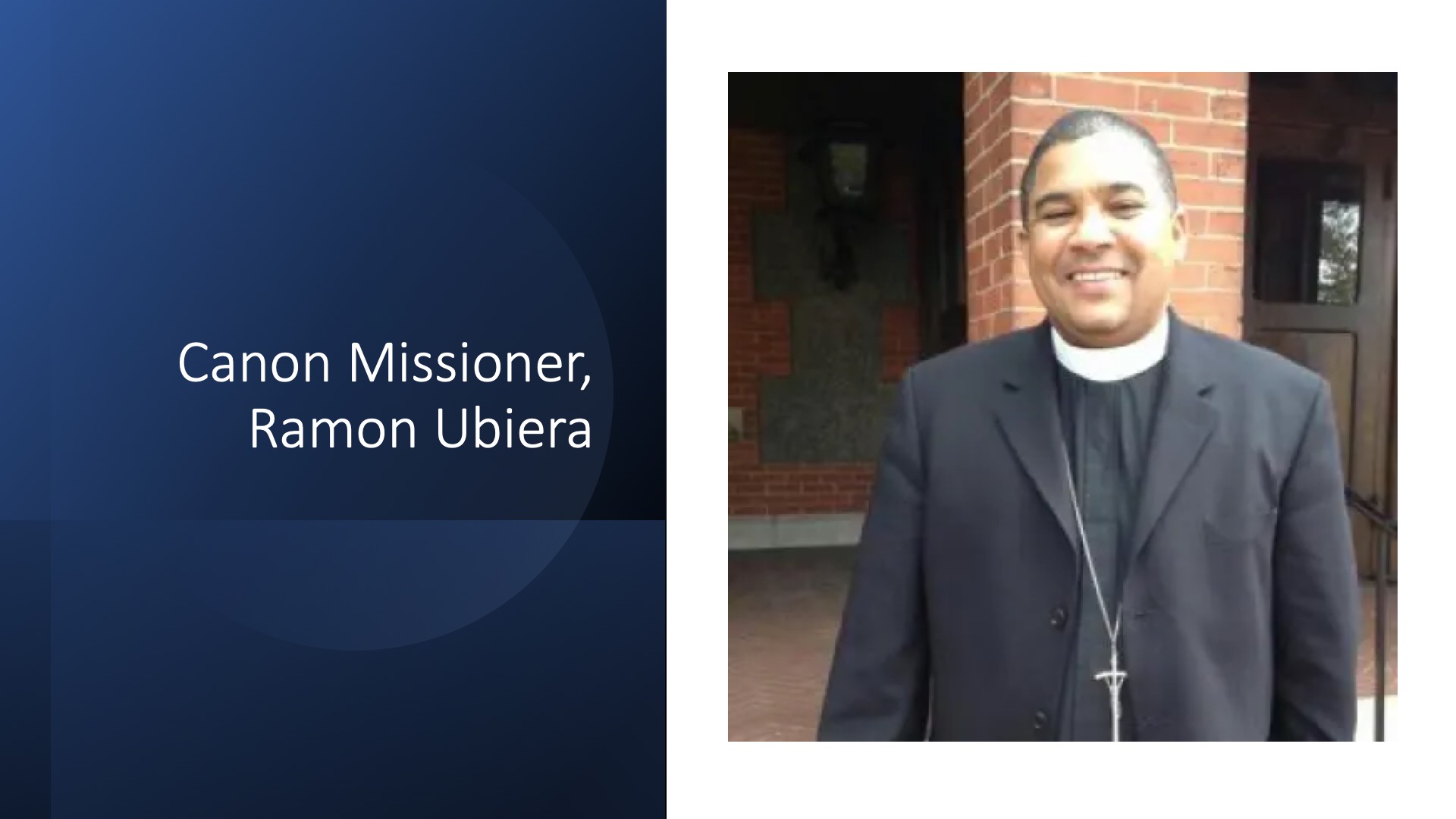 Of course, our mission and ministry within the Hispanic/Latino communities continues to expand and we are equally blessed by our Canon Missioner, Ramon Ubiera who continues to respond to the needs and demands of this ever-growing mission field including pushing out the newly developed “Hispanic Ministry in a Box”—a tool to support predominately mono-lingual congregations who want to reach out to Spanish/Hispanic populations in their communities. I urge you to read Canon Ramon’s report, but I want to highlight one paragraph of his report in particular.
Of course, our mission and ministry within the Hispanic/Latino communities continues to expand and we are equally blessed by our Canon Missioner, Ramon Ubiera who continues to respond to the needs and demands of this ever-growing mission field including pushing out the newly developed “Hispanic Ministry in a Box”—a tool to support predominately mono-lingual congregations who want to reach out to Spanish/Hispanic populations in their communities. I urge you to read Canon Ramon’s report, but I want to highlight one paragraph of his report in particular.
Canon Ubiera wrote, “Many of our Hispanic brothers and sisters had COVID-19, lost someone to COVID-19, or lost their jobs or homes. The Hispanic community was unable to stay home like many of us had the privilege to do. They risked their health and their family’s health in order to survive. Unfortunately, some did not survive and in most of those cases, it was the main provider of the household who got sick. Some of the Hispanics are undocumented and were not able to collect unemployment and were left with no resources to survive. With the job losses, they also have to deal with not affording basic needs or housing.”[13] It is, of course, an accurate report. As we all now know, the impact of COVID-19 on communities of color, especially Black and Brown communities was especially pronounced and reflects the systemic injustices which continue to plague us.[14]
As a church and as a society, we have begun a long-overdue reckoning with this. Two conventions ago, delegates took the very forward step of passing resolution 2020-3, which reaffirmed the will of The Episcopal Church’s General Convention to take action toward racial justice, healing, and reconciliation. Toward this end, we, as a diocesan community, resolved to establish a Task Force to initiate and oversee a multi-year process to examine our sins, complicity, and financial benefits through the history of slavery and its legacy continuing to contemporary practices, and to recommend appropriate actions for the diocese.
As a result, remarkable work has been done by our Reparations Task Force which you can read about in their report. They have been diligent in leading the diocese into this difficult conversation and work, and also in helping us engage at the larger state-wide level, being instrumental in the launch of New Jersey Faith Allies for Reparations in partnership with the New Jersey Institute for Social Justice. This latter effort is focused on advocating for passage of Assembly Bill A938 and Senate Bill S386 which would establish the “New Jersey Reparations Task Force” to conduct research and develop reparatory proposals and recommendations to address the generational harms caused by New Jersey’s role in America’s institution of slavery and its legacy of systemic racial discrimination.
I am now re-designating our Task Force as a commission of the diocese in order to underscore the longer-range trajectory of its work and our commitment to it. I want to state clearly that in doing this work, they are carrying out the mandate of General Convention Resolution 2006-C011 which “urge[d] the Church at every level to call upon Congress and the American people to support legislation initiating study of and dialogue about the history and legacy of slavery in the United States and of proposals for monetary and non-monetary reparations to the descendants of the victims of slavery.”[15] These efforts have my full and unequivocal support. I am grateful to the three indomitable co-conveners of these efforts, Canons Barbie Bach, Annette Buchanan and Noreen Duncan for the work they have done on behalf of all of us.
I am also grateful to Canon Deacon Clive Sang, Our Canon Missioner for Black Ministries who has not only been serving as Deacon Administrator at St. Thomas, Red Bank, but who, with the Commission on Black Ministry, supports, and helps us all support, the work of our historic Black Congregations in the Diocese of New Jersey. Deacon Clive is surely a blessing to us all. It is time for us, in partnership with the Commission on Black Ministry and others of the Black community in the diocese to look carefully at this position and move toward it becoming a full-time position in the 2023 budget. Given the historic efforts we are making in racial justice efforts and in Black ministry, this would seem called for.
Another way that the Diocese of New Jersey is addressing inequality and injustice, and the many human need crises that these generate, is through Episcopal Community Services of the Diocese of New Jersey (ECS-NJ), created a little more than a year ago. ECS-NJ allows us to pull together and support one another’s ministries as a diocesan community in a way that had not been possible before.
Through this ministry we support our congregations in meeting human needs by offering financial, people, and information resources to churches engaged in community ministries of compassion and justice. We offer workshops and share best practices. We offer information sessions so that we all understand better the challenges that face many in our communities, especially the poor and marginalized. Through the ministry of ECS-NJ we encourage networks to advocate for people who suffer and against the injustices that often contribute to this suffering.
In this first full year of operations, we have been blessed with the intrepid leadership of Advisory Committee Co-Chairs The Reverend Canon Joan Mason and Sharisma Ubiera and all those on the Advisory Council who served with them over this past year. They will be offering a fuller report later today.
The Reverend Dave Snyder has been a vital part of the success of the ECS-NJ launch, serving as a part-time Development Officer. Dave has brought dedication, passion and a strong background to the effort. To date, more that $500,000 has been raised and ECS-NJ is now in its second round of issuing grants to our congregations having given out $117,000 last October.
I want to express my particular gratitude to clergy, lay leaders and people of the 15 congregations designated Founding Congregations that showed their support to this endeavor by pledging at least $10,000 to ECS-NJ over three years or less.
In a special leadership category is Trinity Church, Moorestown which committed a percentage of their recent capital campaign to ECS-NJ. Their pledge amounted to $70,000.
The other Founding Congregations are:
- Holy Spirit, Lebanon
- Bernard’s, Bernardsville
- John’s, Salem
- Luke’s, Gladstone
- Paul’s, Westfield (website under construction)
- Peter’s, Spotswood
- Thomas, Glassboro
- Trinity Church, Princeton
- Trinity Cathedral, Trenton
- Matthew’s, Pennington
- Francis, Dunellen
- All Saints, Bay Head
- Mark’s, Basking Ridge
- John’s, Little Silver
I have certificates for each which we will mail to them. It is my hope and prayer that ECS-NJ will grow to be an essential part of the mission and ministry of the Diocese of New Jersey unto perpetuity. I’m thrilled that Deacon Trish Thorme has agreed to serve as the first, part-time Director of the organization. I also continue to look for that donor who I know is out there somewhere, who will seed ECS-NJ with a multimillion-dollar gift to help assure that this vital ministry will outlast us all.
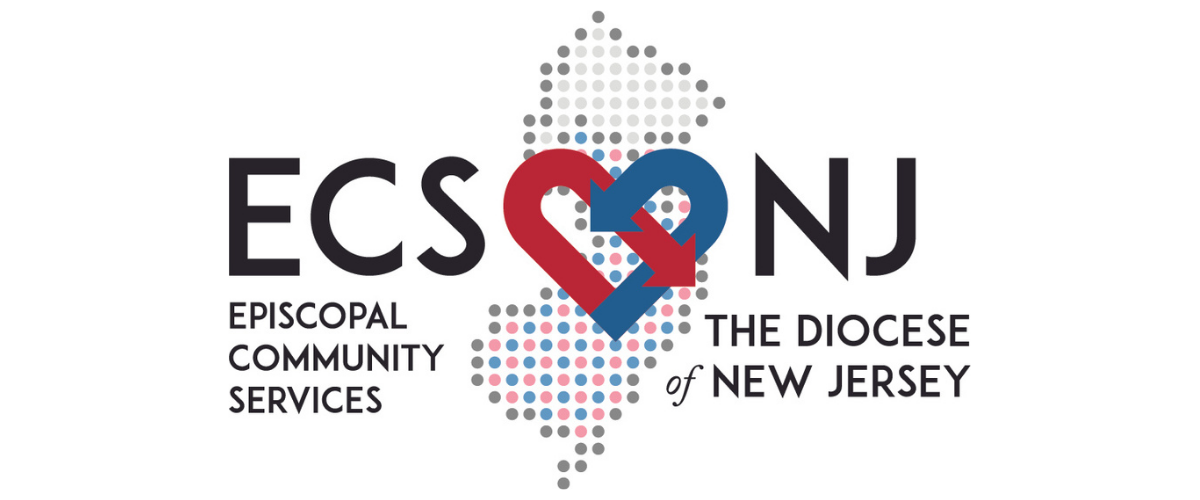 The launch of Episcopal Community Services of New Jersey could not have taken place without the outstanding support and partnership of CCS Fundraising and its highly professional and competent staff – Charlie Michaud, Principal and Managing Director; Evelyn Chen and Jessica Gorman, Vice-Presidents, and Senior Director, Jamie Papageorgiou. All of them have been herculean in their efforts on behalf of the Diocese of New Jersey. Not only were they instrumental in the launch of ECS-NJ, but they have been of enormous support working with The Reverend Bob Fitzpatrick and our Project Resource Team in helping our congregations manage their stewardship programs throughout the COVID-19 pandemic. Fr. Bob Fitzpatrick is another person for whom we should all give thanks.
The launch of Episcopal Community Services of New Jersey could not have taken place without the outstanding support and partnership of CCS Fundraising and its highly professional and competent staff – Charlie Michaud, Principal and Managing Director; Evelyn Chen and Jessica Gorman, Vice-Presidents, and Senior Director, Jamie Papageorgiou. All of them have been herculean in their efforts on behalf of the Diocese of New Jersey. Not only were they instrumental in the launch of ECS-NJ, but they have been of enormous support working with The Reverend Bob Fitzpatrick and our Project Resource Team in helping our congregations manage their stewardship programs throughout the COVID-19 pandemic. Fr. Bob Fitzpatrick is another person for whom we should all give thanks.
Our initial engagement of CCS didn’t anticipate a global pandemic, but when one hit soon after we started working with them, CCS pivoted, and working with Fr. Fitzpatrick who has shown stalwart leadership, as well as Canon Phyllis Jones and Dave Snyder, the leaders of our congregations had a constant flow of ideas that they could put to use and which helped steer us all through the challenges and obstacles of the past two years. I also want to acknowledge Bob for his work on the Clergy Quiet Mornings. Clergy wellness has been a huge concern throughout this pandemic. Fr. Greg Wilson who helped organize the “clergy warm-line” a wellness resource for our clergy and wardens also merits a “shout-out”!
There are so many things to say and so many people to thank. I’d love to say more about Anne Delgado of St. Peter’s, Freehold, who has been amazing as our Chair of the Lifelong Formation Commission along with the Reverend Caroline Carson. Their commission put on a spectacular on-line conference this past February. I’d love to say more about the incredible leadership of our Anti-Racism Commission and Training Team under the leadership of Canon Deacon Ted Moore, Canons Karen Moore, Noreen Duncan, Paul Wolfgang, Barbie Bach and others who have created and hosted outstanding training sessions throughout the pandemic that have reached way beyond the boundaries of our diocese.
I have a lot I’d like to say about The Reverend Genevieve Bishop, Director of our Diocesan School for Ministry and all those who work with her, as well as the students who are making this one of the truly bright spots in our diocese. You must read her report on this ministry. It’s really the first clear and comprehensive picture of what we’re trying to do.
And of course I would not want to forget our deacons and fabulous Archdeacons, Denise Cavaliere, Ted Foley, Lynn Johnson, and Carol Pepe. We are blessed with an amazing corps of deacons. I’d love to say more about Steve Welch, our Canon for Communications not only for his great work on overhauling our website, but for the amazing support he’s been to us all through this pandemic; and to Joe Rodriguez and Clare Gutwein who, despite frustration after frustration, continue to reach out to the youth of the diocese, striving to find ways to connect.
I wish to acknowledge the phenomenal work of our COVID-19 Response Task Forces. The RRR (Reopening, Returning and Reimagining) Task Force Co-Chaired by The Reverend Canon Valerie Balling and Canon Dr. Phil Lewis with members The Very Rev. Rene John, The Rev. Megan Thomas, Ms. Sandy Van Sant, Ms. Michelle Scarpulla, Mr. Michael Redpath, The Rev. Emily Mellott, The Rev. Dr. Canon Kara Slade, Capt. Lou Cavaliere (U.S.N. Ret.), Mr. Tom MacArthur, Canon Annette Buchanan, The Rev. Paul Jeanes, The Rev. Angelo Wildgoose, The Very Rev. Matthew Tucker, Mr. Anthony Conrad, The Rev. Dr. Maria Sanzo, Ms. Carolann Ashby Nicholas, Dr. Ida Brown-Woodson, The Rev. Juan Monge-Santiago, The Reverend Jorge A Martinez, The Rev. Dr. Canon Kevin Moroney.
The Learnings and Breakthroughs Committee Co-Chaired by The Reverend Dirk Reinken, The Reverend Jennifer Ovenstone Smith and The Reverend Amy Cornell with members The Very Rev. Gregory A. Bezilla The Rev. Canon Jayne J. Oasin, The Rev. Genevieve R. Bishop, The Rev. Justin A. Falciani, Ms. Bonnie Bivins, Ms. Anne Delgado, The Rev. Rose Marie Broderick, Dcn. Ms. Mary Testori, Mr. Jonathan Gloster, The Rev. Robert Fitzpatrick, Mr. Sebastian Vazquez, The Rev. Juan Monge-Santiago, The Rev. Canon Dr. Kara N. Slade, The Rev. Canon Andy Moore
Lasty, the Testings and Vaccines Task Force Chaired by The Reverend Marshall Shelly with members The Reverend Gerry Welch, Canon Clara Gregory, Ms. Allie Graham, Ms. Pat Hawkins, Ms. Nayla Caruso, The Rev, Canon Andy Moore, Ms. Rebecca Welch, Canon Mary Ann Rhoads, The Reverend Robin Pierre.
Each of these committees worked countless hours, touching the lives of countless people, to make our churches safe, to learn from the experience and in the case of the last task force, to get shots into the arms of people and to work with the state to create a robust system of testing that was reaching people where testing was most needed.
Yes, there is lots to talk about in the Diocese of New Jersey, so many people to acknowledge and thank, because God is up to so much through us. I’d like to say much more about all of this but I want to be a good steward of our time and we need to get on with the rest of our convention.
Early in this address, I stated that my ministry in this time of transition has two primary foci: to oversee an orderly transition to the 13th bishop and to continue the work we have been doing, building on the foundation. I hope this address offers evidence that these things are happening. We are in transition. Yes, we wait, but our waiting is active. Collectively active. Collaboratively active. The Spirit is on the move throughout our diocesan community. The ruach—the breath of God that blew that first Pentecost—is blowing still.
The purpose of the Diocese of New Jersey is to form people as disciples of Jesus Christ to carry out God’s mission of reconciliation in the world.
I believe we are carrying out that purpose and I thank you for your role in all of it. Together, we are, indeed, strengthening disciples for the future.
As St. Paul said so well,
According to the grace of God given to me, like a skilled master builder I laid a foundation, and someone else is building on it. Each builder must choose with care how to build on it. For no one can lay any foundation other than the one that has been laid; that foundation is Jesus Christ. (1 Corinthians 3:10-11).
Amen.
 The Right Rev. William H. Stokes
The Right Rev. William H. Stokes
Bishop of New Jersey
_________________
Notes
[1] “Christ is made the sure foundation” – Hymn #518 – Hymnal 1982 (New York: Church Hymnal Corporation)
[2] See Hebrews 13:8
[3] Cover of “Profile for the Election of the 12th Bishop of New Jersey” Published by the Diocese of New Jersey (Trenton, NJ, 2012).
[4] Putnam, Robert D Bowling Alone: The Collapse and Revival of American Community (New York: Simon & Schuster, 2020).
[5] See Robert D. Putnam website at http://robertdputnam.com/bowling-alone/
[6] “Preface” – Bowling Alone: The Collapse and Revival of American Community Revised and Updated – 20th Anniversary Edition (New York, etc: Simon & Schuster, 2020) Kindle e-book p. 2
[7] Ibid.
[8] Ibid.
[9] Ibid., p. 10
[10] The concept “Schools of Discipleship” is taken from The Rule of St. Benedict and his understanding that his monasteries were to be “Schools for God’s service.” Conceptually, the focus is not merely on the academic understanding of “school,” but on the holistic which is charged with developing a balanced Christian life as an attitude and a “way of life” marked by worship/prayer, study and service. See Chittister, Joan “Prologue” The Rule of Benedict: Insights for the Ages (New York: Crossroad, 1999), p. 29
[11] See 2012 Profile, p. 14
[12] Translation from Haitian-Creole to English – “Thank you, Fr. Pierre. Great work! You are a blessing to us all”
[13] Ubiera, Ramon – “Hispanic/Latino Ministry Report for Diocesan Convention” – March 5, 2022 see https://dioceseofnj.org/wp-content/uploads/2022/02/Doc-15-Missioner-for-Hispanic-Minisries-Rpt-to-Diocesan-Convention-2022.pdf
[14] See, for example, Introduction to COVID-19 Racial and Ethnic Disparities” published by the CDC, December 10. 2020- https://www.cdc.gov/coronavirus/2019-ncov/community/health-equity/racial-ethnic-disparities/index.html
[15] See 2006 General Convention of The Episcopal Church Resolution C-011 found at https://www.episcopalarchives.org/cgi-bin/acts/acts_resolution.pl?resolution=2006-C011

